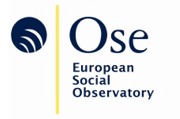Activity reports (PDF): 2024 - 2023
The European Social Observatory (Observatoire social européen, OSE) is a Brussels-based not-for-profit research centre specialised in the social dimension of the European Union (EU). Its mission is to analyse the impact of European integration on social and employment policies both at EU level and within Member States. It does this by conducting comparative research and formulating policy proposals. With its forward-looking approach, it operates as a thinktank, identifying issues as they emerge – from the impact of the internal market on healthcare systems and the social challenges associated with the EMU to the ‘greening’ of EU recovery and the social consequences of digitalisation. As a result of its vibrant research activity, the OSE has been consistently ranked (by the University of Pennsylvania) since 2016 among the top 100 social policy thinktanks worldwide
Founded in 1984, the OSE draws on a broad network of Belgian and European public authorities, thinktanks, the scientific community, social partner organisations (notably European and national trade unions) and civil society. Its team of researchers – swelled by research associates and interns from all over Europe and North America – is multidisciplinary and multilingual. The OSE has likewise acted as coordinator or partner in a variety of European projects and is actively involved in major networks of academic excellence funded under Horizon Europe and its predecessors. Since 1999 the OSE has provided substantive input for an annual volume entitled ’Social policy in the European Union: state of play’, published by the European Trade Union Institute (ETUI).
Areas of expertise
- Employment and labour markets
- Healthcare
- In-work poverty, poverty and social exclusion
- Job quality and working conditions
- Social dialogue
- The socio-ecological transition
- Social protection, including pensions
Over the years, the OSE has also gathered multidisciplinary expertise in such cross-cutting areas as gender and non-discrimination, the EU’s socio-economic governance, the European Green Deal and European pandemic recovery. The social dimension of European integration is assessed through the lenses of a variety of policymaking mechanisms, including the open method of coordination, EU legislation, EU funding and social dialogue.
Communications tools
- Our regular OSE Flash news, providing a quick update on OSE key events and publications.
- The newsletter European Health Care News (in Dutch, English and French), providing summaries of current EU developments with the potential to affect national healthcare systems.
- OSE Paper Series, featuring Research, Briefing and Opinion papers.
- National and international conferences, webinars and workshops.
- Twitter account and LinkedIn page.
- The OSE website (in English and French)
